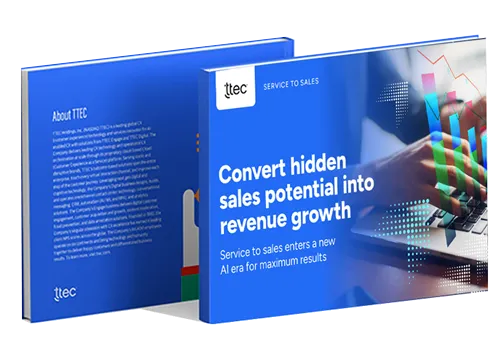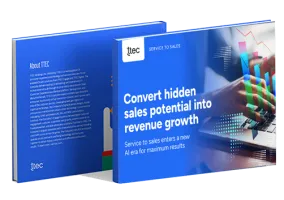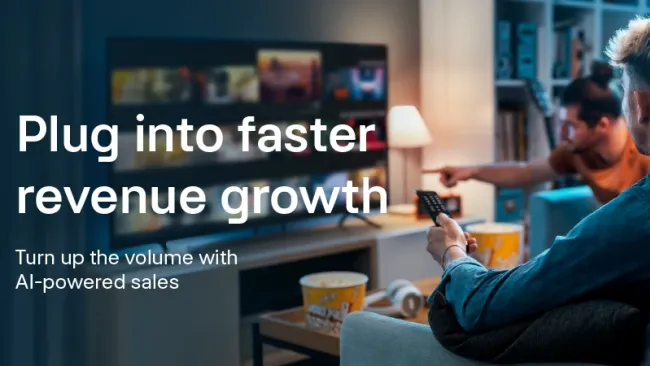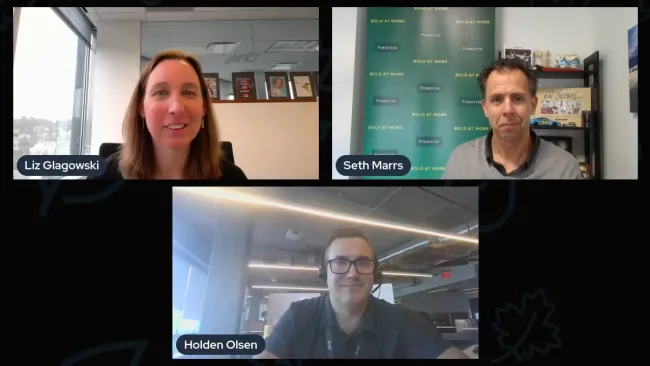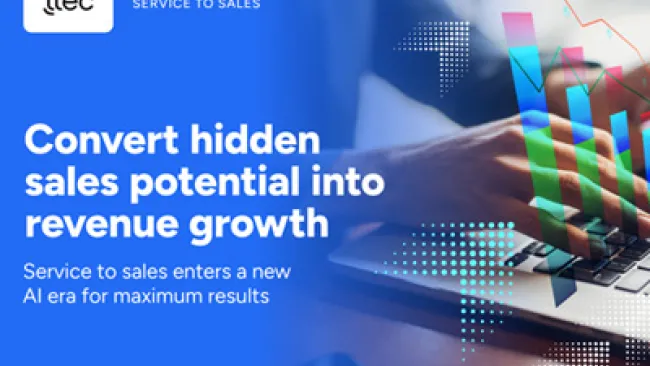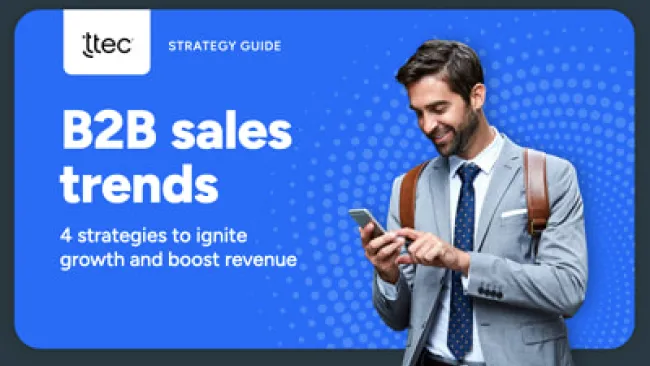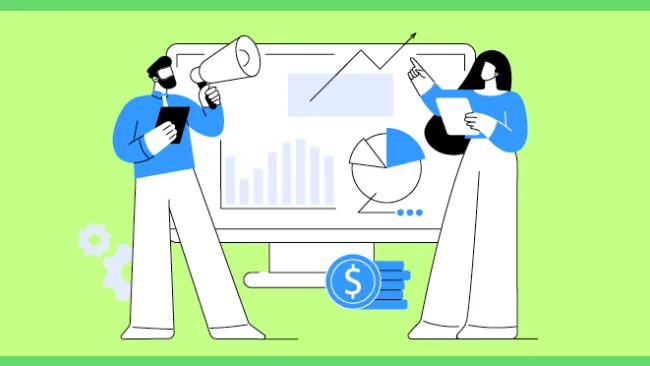Like quicksand, the COVID-19 pandemic has swallowed sales quotas, processes, activities, and operations, leaving behind a trail of uncertainty. Sales professionals face numerous questions: What does the future of selling look like and how do we adapt? What should we do to stay productive? How will we build connections with clients moving forward?
We recently gathered insights from TTEC’s sales growth experts to answer burning questions about selling in today’s transformed reality.
How do I enable a sustainable sales environment with at-home sellers?
Although some states are beginning to lift their quarantine orders, many workers are a long way off from returning to the office, if ever. Global Workplace Analytics estimates that 25 to 30 percent of the workforce will work from home multiple days a week by the end of 2021, up from 3.6 percent prior to the pandemic.
Sales leaders need to plan for managing remote teams on an extended or even permanent basis. The key to enabling sellers and other employees to work productively and successfully in a remote environment is to establish regular communication streams. Maintain daily video conferences to quickly review priorities and tasks just as you would for an office meeting.
Set up a peer-to-peer communication channel for informal conversations and collaborations, such as over a messaging app, in addition regular training and coaching sessions. Offer virtual coffee breaks, lunch-and-learn sessions, and virtual happy hours to build camaraderie. And don’t forget to acknowledge wins at meetings. The goal is to help sellers feel that they are part of a cohesive team—wherever they are.
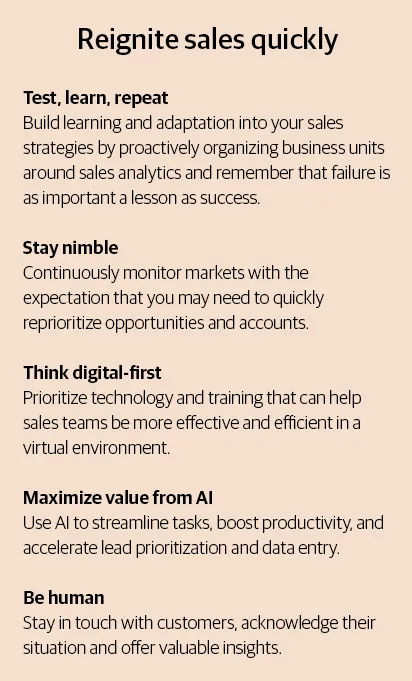
How do I justify adding more sellers when budget is tight or non-existent?
Justifying the need to hire new sellers when most companies are tightening their budgets is challenging, but now is the time when talented, experienced sellers are most essential. An outsourcing partner that is experienced in rapidly training and ramping up sales teams is an effective way to extend resources. Additionally, remote workforces can be scaled up or down as needed and increase operational efficiencies while reducing costs.
Artificial intelligence and automation are also invaluable in maximizing resources. Even before the pandemic, AI was streamlining data-driven tasks, boosting productivity, and accelerating lead prioritization and data entry. Now is the time to lean into AI to drive speed to value. A buyer, for instance, could be greeted by an AI-enabled chatbot that quickly gathers information about the type of product that the buyer is interested in and routes the message to the right salesperson. On the backend, AI can provide the sales representative with relevant buyer insights in real time while also performing data entry.
What should our sellers focus on if deals are on hold?
Check in with clients and listen to what they need at this time. Be empathetic to the challenges that clients are facing. Even if a client puts a deal on hold, continue to reach out, share information, and maintain the relationship. When the client is ready to resume buying, your company will be top of mind.
Be proactive in providing useful insights and value. For instance, bringing your clients together in a group meeting where they can share notes and challenges is a valuable opportunity for your clients and increases goodwill toward your company’s brand. And with deals on hold, approach that time as an opportunity to pursue new markets. Be creative: What products or services could be retooled for a different industry?
How can I use data to deliver the right message?
With market needs evolving so quickly, data analytics and insights are more important than ever. An experienced partner can help companies identify, implement, and deploy the right data analytics tools to understand and anticipate buyer sentiment and behavior. Data insights are invaluable for understanding buyer intent and interest across the entire life cycle to drive growth and retention. These insights are also crucial to uncovering new demographic groups and opportunities.
What is an effective way to engage prospects and clients?
In a quarantined environment, salespeople need to think in terms of virtual selling. At the same time, individuals have different preferences for how they want to be communicated to and sold to in the sales and buying process. Be prepared to communicate with buyers through a variety of platforms and devices from video conferencing tools to mobile apps, SMS, web, social, and voice. As buyers come to expect seamless and personalized virtual experiences at every step of the buyer journey, an internal flow of customer data and collaboration across the organization will be more important than ever.
How do I align field sales with inside sales?
A team effort has always been required to succeed in sales. This is especially true today. Sales organizations must effectively utilize all the available resources and be prepared to work in a more fluid model. Equipping field or outside sellers with the training, coaching, and resources to do inside selling maximizes resources and vice versa. From a tactical perspective, an at-home sales model also allows for greater flexibility and more personalized meetings. For example, a field sales team could line up meetings and pass them on to an at-home inside seller within the prospect’s geographic footprint to provide more relatable conversations.
Recalibrate for a new normal
The bottom line is that even after the pandemic recedes, selling will not return to pre-COVID conditions. Trends that were already in motion have been accelerated and sales organizations are facing a new normal. Instead of despairing, sales professionals have an opportunity to find new ways to connect with clients and do what they do best—help clients solve their problems.

